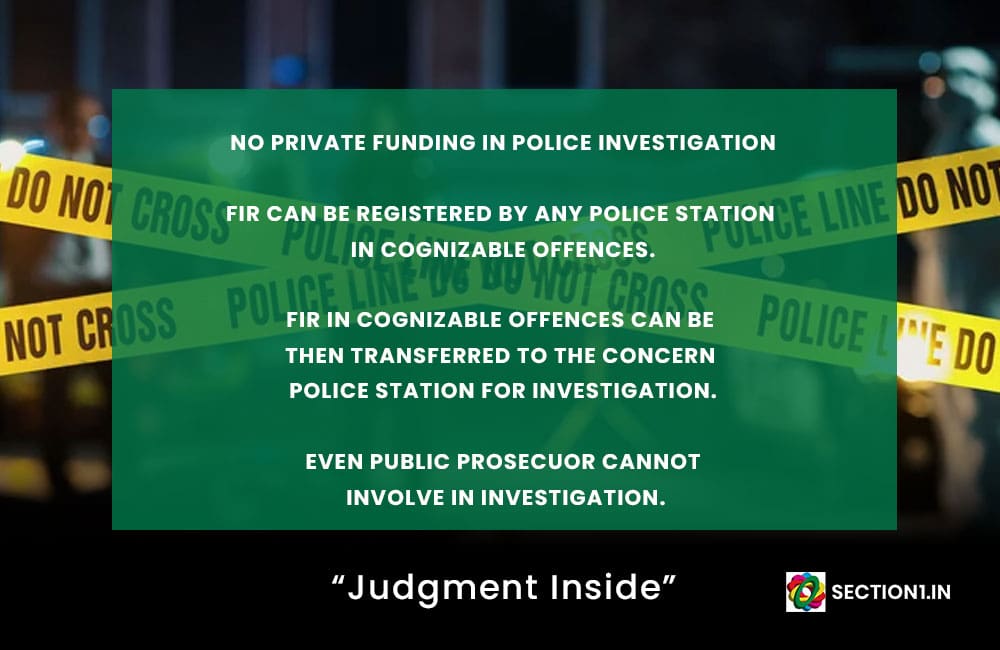Thus, the question has bogged down to this: Can a statutory investigating agency be directed to obtain financial assistance from private parties for meeting the expenses re-quired for conducting the investigation?
COGNIZABLE OFFENCE – FIR IS MUST EVEN THOUGH SHO HAS NO JURISDICTION – REGARDING NON-COGNIZABLE OFFENCE SHO HAS TO REDUCE ONLY IF COMMITTED IN HIS JURISDICTION: “Investigation” is defined in Section 2(h) of the Code as including “all the proceedings under this Code for the collection of evidence conducted by police officer or by any person (other than a magistrate) who is authorised by a magistrate in this behalf.” Hence no proceedings outside provision of the Code can be dragged into the contours of investigation. In other words, any proceedings falling outside the ambit of the Code will not be regarded as investigation for the purpose of the Code. Under the scheme of the Code, investigation commences with lodgement of information relating to the commission of an offence. If it is a cognizable offence, the officer-in-charge of the police station to whom the information is supplied orally has a statutory duty to reduce it to writing and get the signature of the informant. He shall enter the substance of the information, whether given in writing or reduced to writing as aforesaid, in a book prescribed by the State in that behalf. The Officer-in-charge has no escape from doing so if the offence mentioned therein is a cognizable offence, whether or not such offence was committed within the limits of that police station. But when the offence is non-cognizable, the officer-in-charge of the police station has no obligation to record it if the offence was not committed within the limits of his police station.
I.O HAS TO TRANSFER THE FIR TO THE CONCERNED JURISDICTION: Section 156(1) of the Code says that the said police officer can investigate any cognizable offence covered by the said FIR, if the said offence could be inquired into or tried by a Court having jurisdiction over the local area of that police station. If the offence was committed outside the limit of such police station, the officer-in-charge of the police station can transmit the FIR to the police station having such territorial jurisdiction. Various States have formulated rules for effecting transfer of such FIR in such contingencies.
PRIVATE PERSONS CANNOT FUND THE INVESTIGATION: The Code does not recognise private investigating agency. If any person is interested in hiring any such private agency, he may do so at his own risk and cost, but such investigation would not be regarded as investigation made under law. Any evidence collected in such private investigation and any conclusion reached by such investigators cannot be presented by Public Prosecutor in any trial. Of course, it may be possible for the defence to present such evidence. In this context, we may refer to a recent decision of this Court R. Sarala v. TS Velu, [2000] 4 SCC 459. This Court said that even a Public Prosecutor cannot be officially involved during the stage of investigation.
The following observations made by this Court in the said decision will be useful:
“Investigation and prosecution are two different facets in the administration of criminal justice. The role of a Public Prosecutor is inside the court, whereas investigation is outside the court. Normally the role of a Public Prosecutor commences after the investigating agency presents the case in the court on culmination of investigation. Its exception is that the Public Prosecutor may have to deal with bail applications moved by the parties concerned at any stage. Involving the Public Prosecutor in investigation is unjudicious as well as pernicious in law. At any rate no investigating agency can be compelled to seek the opinion of a Public Prosecutor under the orders of the Court.”
The above discussion was made for emphasising the need for official investigation to be totally extricated from any extraneous influence. The police investigation should necessarily be with the fund supplied by the State. It may be possible for a rich complainant to supply any amount of fund to the police for conducting investigation into his complaint. But a poor man cannot afford to supply any financial assistance to the police. It is an acknowledged reality that he who pays the piper calls the tune. So he would call the shots. Its corollary is that somebody who incurs the cost of anything would normally secure its control also. In our constitutional scheme, the police and other statutory investigating agency cannot be allowed to be hackneyed by those who can afford it. All complaints shall be investigated with equal alacrity and with equal fairness irrespective of the financial capacity of the person lodging the complaint.
PARTY: NAVINCHANDRA N.MAJITHIA vs. RESPONDENT: STATE OF MEGHALAYA AND OTHERS – 16/10/2000 – 3 Judge Bench.
URL: Download
Files :



